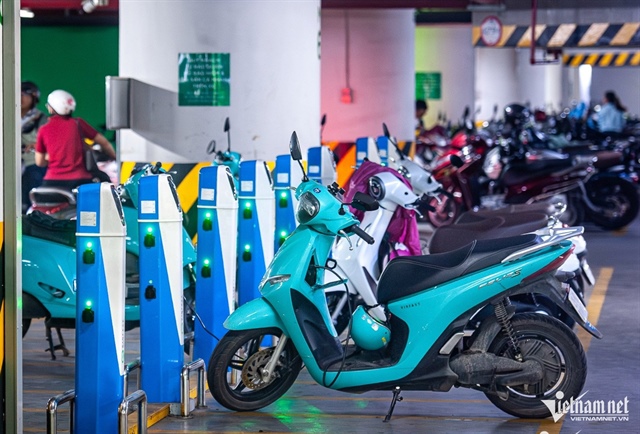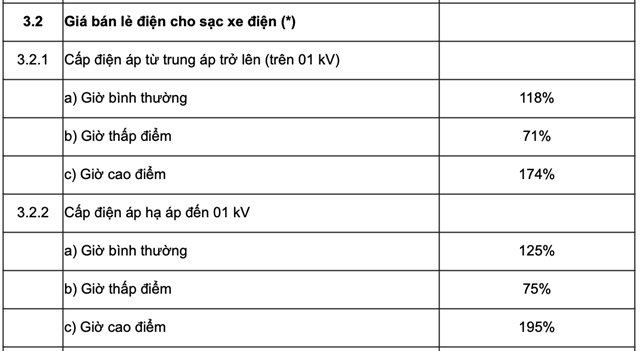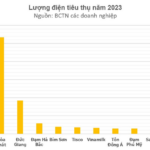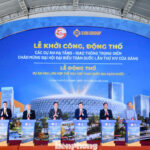Option 1 (General regulation): Retail electricity prices for electric vehicle charging are applicable to electricity buyers who use charging stations/poles for transportation vehicles (including electric buses) and are required to install separate meters, except for residential households with installed charging poles.
In the case of electric vehicle charging for households that have signed electricity contracts for domestic use, the domestic electricity price will be applied to the total measured volume.
 Electric vehicles are becoming a popular choice for many families, especially in big cities. Photo: The Bang |
Option 2 (Detailed regulation for price application and specification for 2 cases: with and without separate meters): Electric vehicle charging includes charging stations/poles serving electric-powered means of transportation, including electric buses, and must be equipped with separate meters.
If a customer signs up for a residential electricity contract but uses the same connection for charging their vehicle, the residential electricity price as per current regulations will be applied to the total measured electricity volume.
For non-residential electricity use, the retail electricity price according to the specific purpose of use will be applied if there is a separate meter.
In the case of no separate meter for electric vehicle charging, the electricity price will be based on the purpose stated in the electricity sales contract.
Regarding retail electricity prices for electric vehicle charging, the Department of Electricity (Ministry of Industry and Trade) stated in the Report on the draft Circular guiding the implementation of retail electricity prices that Appendix Decision No. 14/2025/QD-TTg has supplemented the price structure for electricity sold to customers in accommodation establishments and electric vehicle charging stations. Therefore, it is necessary to provide guidance on electricity prices for these objects.

Price structure for electric vehicle charging according to Decision No. 14 of the Prime Minister. |
The draft Circular has been restructured to separate the provisions for accommodation establishments, electric vehicle charging, and other business households into three distinct articles.
Regarding electricity prices for electric vehicle charging, according to the Vietnam Electricity Group (EVN) and some electricity corporations, charging stations/poles must be equipped with separate meters (except for charging poles of households with electricity contracts for domestic use) because the operation of electric vehicle charging stations significantly impacts the power system, especially during peak hours.
However, Ho Chi Minh City Power Corporation opined that it is not necessary to install separate meters for charging stations/poles. For example, in the case of a cafe or restaurant that has installed an electric vehicle charging pole, there is no need to separate the meter, and the business electricity price will be applied to the total measured electricity volume.
Considering the above opinions, the Ministry of Industry and Trade proposes two options in Article 10 of the draft Circular for discussion. This is a new type of electricity use, and there can be diverse forms of charging, such as home charging, public charging, charging at shopping centers, parking lots, administrative agencies, and enterprise compounds.
Tam An
– 13:35 22/08/2025
The Power of Electric: Unveiling Two Revolutionary Retail Electricity Plans for Electric Vehicle Charging
The Ministry of Industry and Trade has proposed two options for electricity retail prices for electric vehicle charging. In a move to encourage the adoption of electric vehicles, the proposal suggests that cafes and other businesses offering electric vehicle charging stations may need to install separate electricity meters.
The Power Sector’s Pivotal Year: 2024’s Key Policies Unlocked
In 2024, the power industry witnessed a series of events and policy changes. Notably, EVN was authorized to increase electricity rates every three months, the amended Power Law was passed, and regulations on renewable energy were introduced. These developments marked significant shifts in the industry’s landscape over the past year.
The Power of Persuasive Pricing: Unveiling the Electricity Tariff Reform
The newly amended Power Law, recently passed by the National Assembly, introduces groundbreaking changes to the energy sector. Notably, electricity prices will now be determined by market forces, a significant shift towards a more dynamic and responsive energy landscape in [country].
Renters in Ho Chi Minh City Get Access to Electricity at Cost Price
The Ho Chi Minh City Electricity Corporation (EVNHCMC) has implemented an impressive initiative, providing electricity subsidies to approximately 1.5 million students and tenants across 66,000 boarding houses in Ho Chi Minh City. This endeavor is in line with the regulations set by the Ministry of Industry and Trade, ensuring that those who rent their homes receive a fair and equitable deal when it comes to their electricity bills.




















